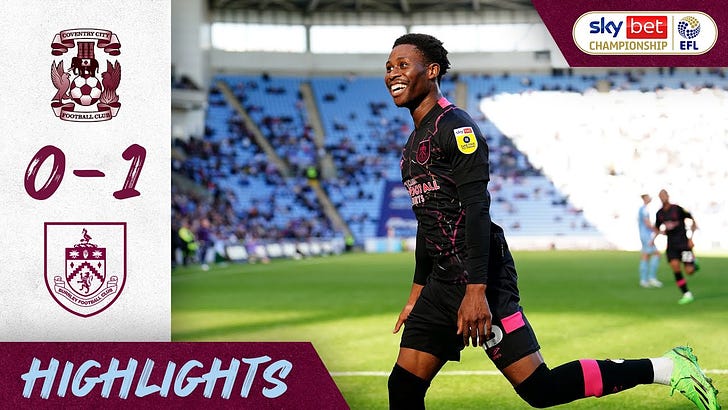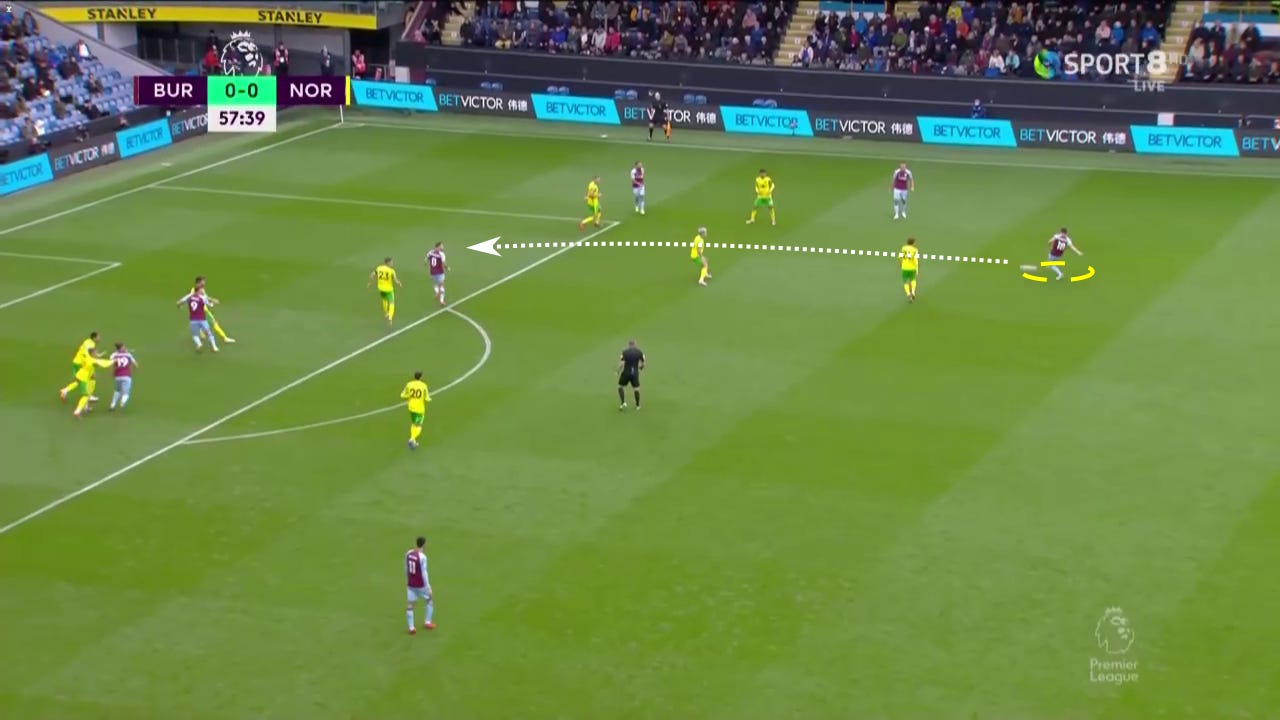Apologies for the delay delivering a newsletter - life has been catching up with me. Today’s lead article comes from Nate, on the potential impact of a forgotten man.
Westwood to the rescue?
As Burnley finally saw a 1-0 win over the line against Coventry City, the Clarets’ anaemic attack is still a cause for concern.
Despite dominating the ball, Burnley generated just 0.77 expected goals on 13 shots per Fotmob. The Clarets continue to struggle at turning possession into quality scoring opportunities. But some help might be on the horizon.
Ashley Westwood is back in training as he continues to recover from the serious ankle injury sustained against West Ham last season. His quality on the ball, specifically his passing could unlock Burnley’s attack.
First, a couple of paragraphs about how good he was last season even playing for a team that struggled mightily with the ball. If you don’t want to think about that season again, I get it - just skip ahead.
Westwood’s passing ability is clear to anyone who has watched Burnley since his arrival in 2017. Even playing for a team that scored the second-fewest goals (32) on the fourth-lowest xG (39.0), Westwood managed to rank statistically as an above-average Premier League midfielder in a couple of key passing categories. He ranked well above average compared to other Premier League midfielders for key passes (75th percentile), passes into the final third (60th), passes into the penalty area (74th), switches (84th), progressive passes (65th), and expected goals assisted (81st).


Last season, Westwood accounted for an outsized percentage of Burnley’s forward passing. In matches he played, Westwood completed more than 17% of the Clarets’ progressive passes, passes into the final third, passes into the opposing penalty area, and key passes. It’s not an exaggeration to say that Burnley’s ball progression strategy in 2021-22 largely centred around Westwood’s right foot.
So how might Westwood fit in with Vincent Kompany’s Burnley? The most likely scenario seems to be Westwood replacing either Jack Cork or Josh Cullen at the base of midfield. In the build-up, his ability to find open team-mates in the final third and generally push the ball from forward might allow the Clarets to play faster, attacking opposing defences in moments of transition.

Similarly, Westwood’s willingness and record of success switching play should create favourable matchups for Burnley’s attackers. Against Coventry, to my eye, some of Burnley’s most promising moments came after quick horizontal ball movement shifted the point of attack to the other side of the pitch.
In the final third, Westwood should be able to help pry open opposition defences sitting deep. Westwood’s ability to receive the ball in the half-space at the top of the box and pick out a cross was a major feature of Burnley’s attacking game plan in previous years. Cork and Cullen have found themselves on the ball in similar situations this season and haven’t found the final pass.
Take this example from last season:
Westwood curls a cross over the centre-back stepping to cover Maxwel Cornet in the middle of the box and finds Dwight McNeil’s head. The shot wasn’t on target but it’s not hard to envision Nathan Tella making a run similar to McNeil’s.
Here’s another example from the same general area of the field.
Westwood hits this pass with his first touch, splitting four Norwich defenders to find Josh Brownhill in the penalty area. There was certainly a window for the pass but Westwood’s technical ability to hit it first time and in the exact spot is something we haven’t seen from Burnley midfielders this season.
Teams will likely continue to sit deep and make Burnley break them down. Westwood showed he has an ability to pick apart teams given time and space on the ball. Projecting Westwood into a much more possession-heavy system isn’t a sure thing but I’ll err on the side of believing that a player who proved to be an effective passer even without much time on the ball will succeed.
Westwood’s potential return raises other questions for Kompany, though. A Westwood-Cullen double-pivot probably adds value offensively but also likely has some drawbacks defensively. Jack Cork’s ability to claim second balls in midfield and to provide defensive solidity would make him a tough drop after his play this season.
Would Westwood be able to fill in the variety of roles where Cullen has played this season? It certainly seems possible. Kompany could also opt to bring back more of a ball-winning midfield partner like Josh Brownhill to pair with Westwood while playing someone else at the #10 [does Scott Twine exist? - ed] in his 4-2-3-1.
Though it feels like the season has been going on for a while already, we’re only 30% in. There’s plenty of time for mixing and matching. However Kompany chooses to adjust his team, Westwood’s return provides midfield depth and potentially another dimension to help the Clarets create more consistent goal-scoring opportunities.
Deja vu
I couldn’t watch Saturday’s game, so obviously we did a lovely win. Though we sit in the play-off places and within striking distance of the top two, it was just our fifth.
Only one defeat shows we are hard to beat, but there have been far too many draws. Turning just a couple of those draws into wins would have us top of the table.
That we finally closed a game out and kept a clean sheet is worthy of praise, but it’s also necessary to point out Coventry are pretty rubbish. Better sides might well have found a late equaliser, which has been happening a concerning amount of late.

It’s clear to me that trying to win games 1-0 is just not going to be an effective strategy. That’s for a few reasons, but the lack of height/aerial ability in our defence is being exploited seemingly on a weekly basis right now. Whenever an opposing winger has space to cross and there’s a big striker waiting, it just feels like an automatic goal.
Having named the same back line for the first few games, Kompany appears to have lost confidence in a couple of players - particularly Charlie Taylor - and it seems unclear whether he knows his strongest defensive unit.


The Stoke game was essentially a repeat of the Cardiff match. Burnley dominated the ball and eventually forced an opening goal, but didn’t look particularly bothered about trying to get a second, then conceded what felt like an inevitable late leveller. We have enough firepower to put most teams away so I don’t understand why we opt for keepball rather than a second goal that would kill off the opposition properly.
A young team and relatively inexperienced manager will make mistakes but the Championship is an unforgiving league. Repeating errors is just not good enough.
Hopefully Coventry will be a turning point, but Swansea on Saturday is a tough test.
Letters
My last newsletter was an admission I feel quite bored watching Burnley right now. Chris got in touch in the post’s comments to make some fair points in response:
Couldn’t agree more. When it works (Huddersfield, when it seemed like wave after wave of attacks) it’s great. When it doesn’t work it’s so frustrating and boring!
I just wish we’d use the pace that we have in the side now and pass into space than into feet. We’ve not had any pace since Danny Ings and now we’ve probably got 4/5 rapid players - use it!
The point about waves of attacks is crucial. Too often, we play the ball back to ‘reset’, which also allows the opposition to get back into position and catch a breath. We simply have not created those waves of pressure since the opening game. Why is that?
That’s it for this week. I’ll try not to leave it nearly a month before the next one. As ever, your feedback is welcome so please do get in touch with any comments. How do you see Westwood fitting into Kompany’s midfield? Does he get into the team?





